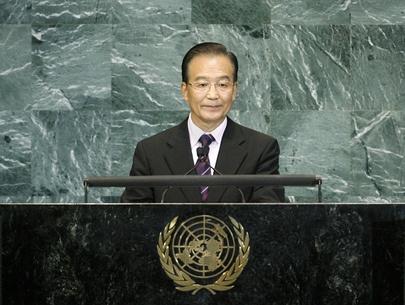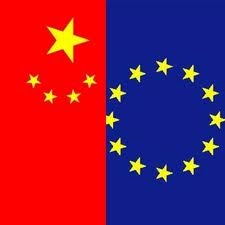

China offer to assist in the Eurozone crisis to further strategy to convert its continued rising economic weight into a more and assertive political context. This time the focus is not its developing Asian neighbors or resource rich Latin American or African states, but Europe and the heart of the Euro-Atlantic alliance. It is also not coincidence that the “offer” comes as China’s Prime Minister Wen Jiabao (PHOTO ABOVE at UN) has started his visit to the United Kingdom this week.
China did not specify how it would participate, but merely the indication of the offer has been enough to garner credit – everyone knows that China has the means to back up its talk. Nonetheless, the details as they come to take shape will be interesting here; if for no other reason than that assisting the floundering “PIGS” (economically floundering Euro economies including Greece) is not merely a liquidity consideration. The challenge is considerably more structural and the solutions likely offered will have complex and longer-term implications for relations within the Eurozone, EU and with China.
Greece Crisis - Structural and Not Merely Liquidity Problem:
Upon the heels of the Chinese “offer,” France’s President Nicolas Sarkozy publicly stated that 30-year term loans would be needed to bailout Greece. This starts to resemble more aid and less loan and is a sound recognition that Greece is not facing a mere liquidity crisis.
Up to know, Europe’s leaders have largely offered assistance that failed to incorporate needed structural adjustments. Austerity on its own cannot deliver the longer-term economic growth even as inefficiencies and perhaps embedded abuses are addressed. PIMCO’s (the largest global bond fund and industry trend setter based in the United States) CEO and co-CIO and former IMF official Mohamed El-Erian pointed out that Greece’s crisis has been so far largely addressed as liquidity challenge, and this misdiagnosis has only served to more broadly infect all of Europe’s financial system as well as failing to address Greece’s core problem.
Presumably China’s assistance will be on similar terms as being offered by the rest of the EU and the IMF. China’s emergence though will undoubtedly offer Greece a new negotiating opportunity, and it remains to be seen if China will act in unison with Eurozone sovereign lenders or opt to provide more generous terms to Greece, a strategic NATO and EU partner. A default by Greece on its debt still appears inevitable, at least in technical terms – a “voluntary” extension of new 30 year loans in exchange for Greek debt coming due now – see our previous article - “Greek Default-Sooner or Later?” -
diplomaticallyincorrect.org/films/blog_post/greek-default-sooner-or-later-by-ambassador-mo/30326
China’s maneuver could potentially backfire if it was seen as too manifestly driving even a small wedge into the Euro-Atlantic alliance. The US undoubtedly would be vigilant regarding its strategic interests. However, China has apparently chosen its timing well – when not only there is a need for its vast currency reserves but also a degree of disarray hangs on the southern edges of the Eurozone and Euro-Atlantic alliance.
China with Immediate Agendas & Long Memory and Perspective:
China’s price for playing may be both obvious and subtle. China sees the “Sparsely Islands” dispute as a bilateral or regional issue and wants the international community, US and UN to stay clear. Tibet has been a popular cause among Europe’s cultural elite. China has faced pressure on a variety of human rights issues, including its treatment of dissidents. China’s involvement in copyright and “export of technology” issues remains contentious. China may also though want a more assertive Eurozone to establish an alternative to the US Dollar leadership at level of multilateral financial institutions at the critical time that Europe may have again cornered the IMF Chief post. (China is increasingly pressing for a new IMF “reserve currency. ” China also though tends to have a considerably longer perspective regarding its strategic goals.
The EU and its powerhouses want China’s money but probably not its so close involvement. China is perceived as assuming a new mercantilist role that some of Europe’s powerhouses only played a century earlier in China. China’s memory also is very long and the Boxer Rebellions are a mere tick in time as reflected against the backdrop of China’s long civilization. I believe President Sarkozy’s revised “offer” of 30-year loan terms to Greece is recognition of the new realities, opportunities and risks of China’s emergence as benefactor, banker and player in the center of the EU and Euro-Atlantic alliance.
See our Most Recent ARTICLES on Eurozone Crisis –
“Death of the Euro?” -
diplomaticallyincorrect.org/films/blog_post/death-of-the-euro-by-ambassador-mo/29753
“Greek Default-Sooner or Later?” -
diplomaticallyincorrect.org/films/blog_post/greek-default-sooner-or-later-by-ambassador-mo/30326
Related Reports at “International Financial Crisis Channel” -
diplomaticallyincorrect.org/c/international-financial-crisis
By Ambassador Muhamed Sacirbey
Facebook – Become a Fan at “Diplomatically Incorrect”
Twitter – Follow us at DiplomaticallyX



